Unit 1 Advertising Grammar and usage(1)_ Direct speech and reported speech课件(31张)
文档属性
| 名称 | Unit 1 Advertising Grammar and usage(1)_ Direct speech and reported speech课件(31张) |
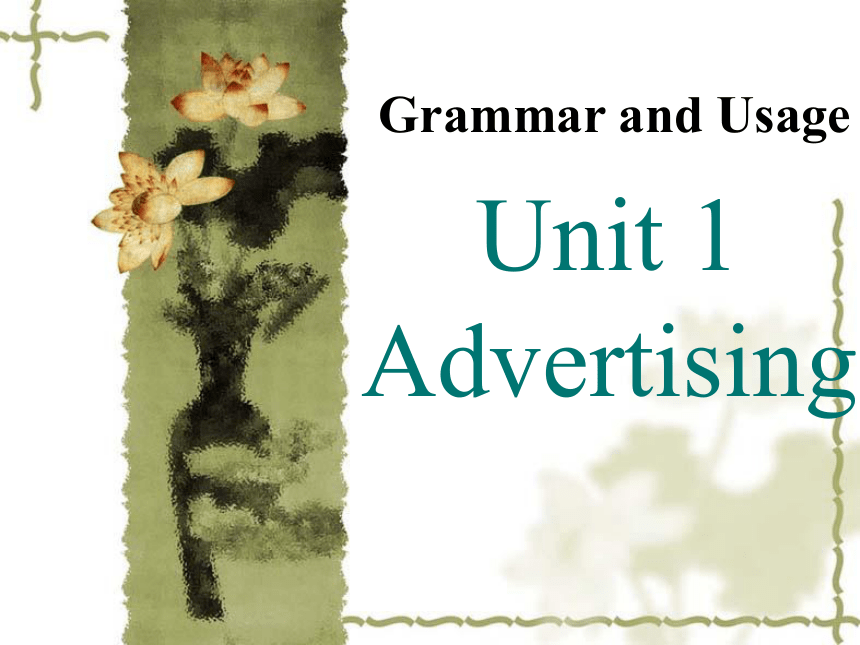
|
|
| 格式 | zip | ||
| 文件大小 | 584.7KB | ||
| 资源类型 | 教案 | ||
| 版本资源 | 牛津译林版 | ||
| 科目 | 英语 | ||
| 更新时间 | 2019-07-25 00:00:00 | ||
图片预览

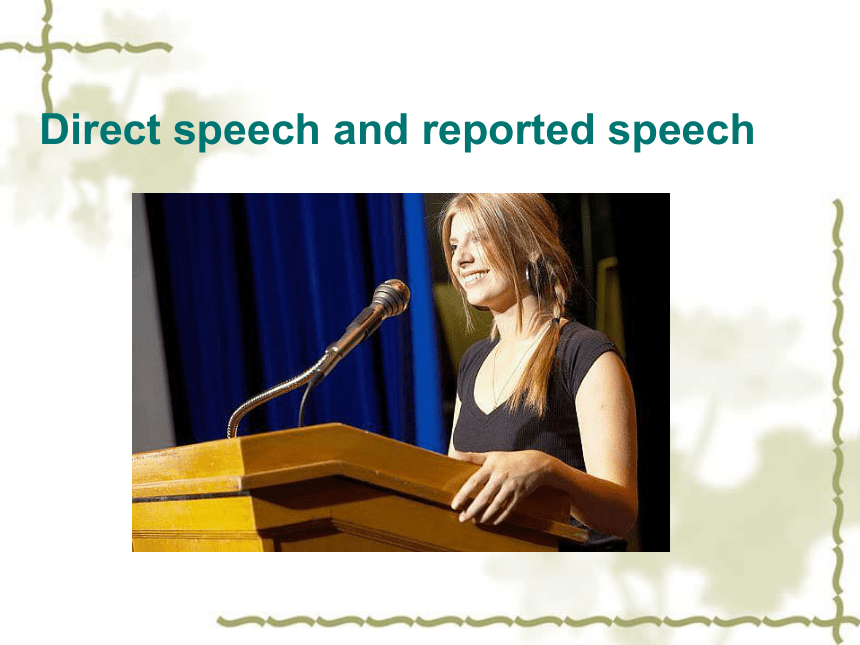
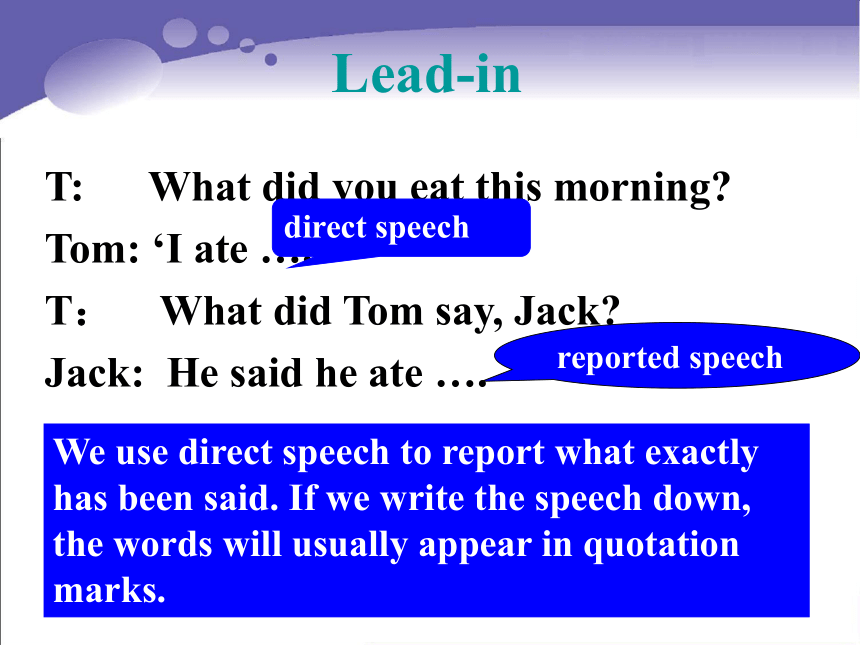
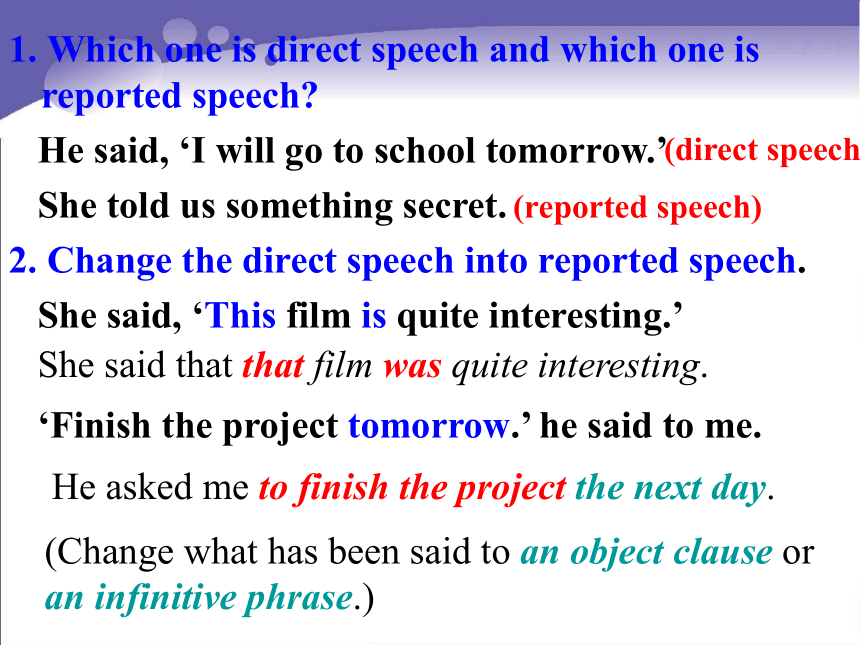
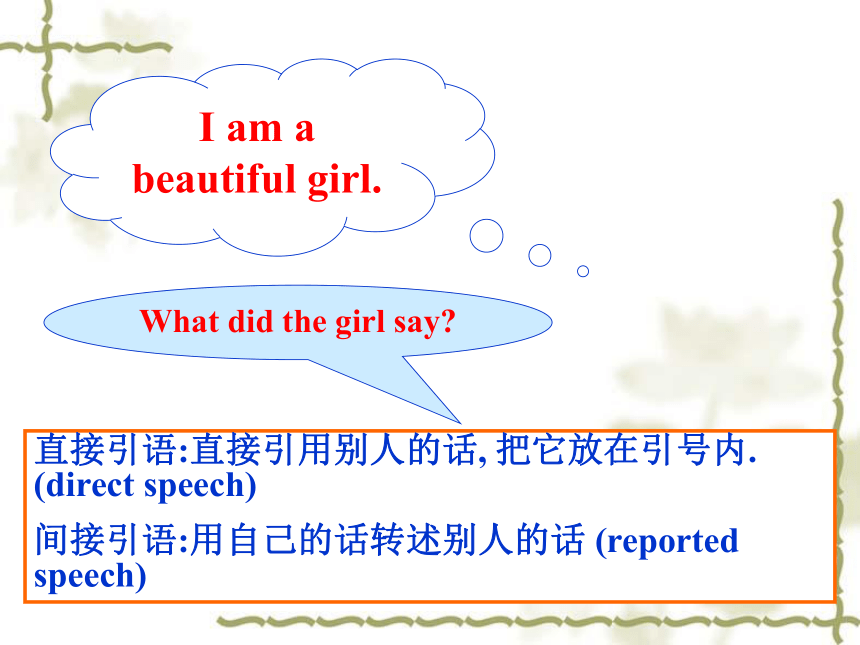
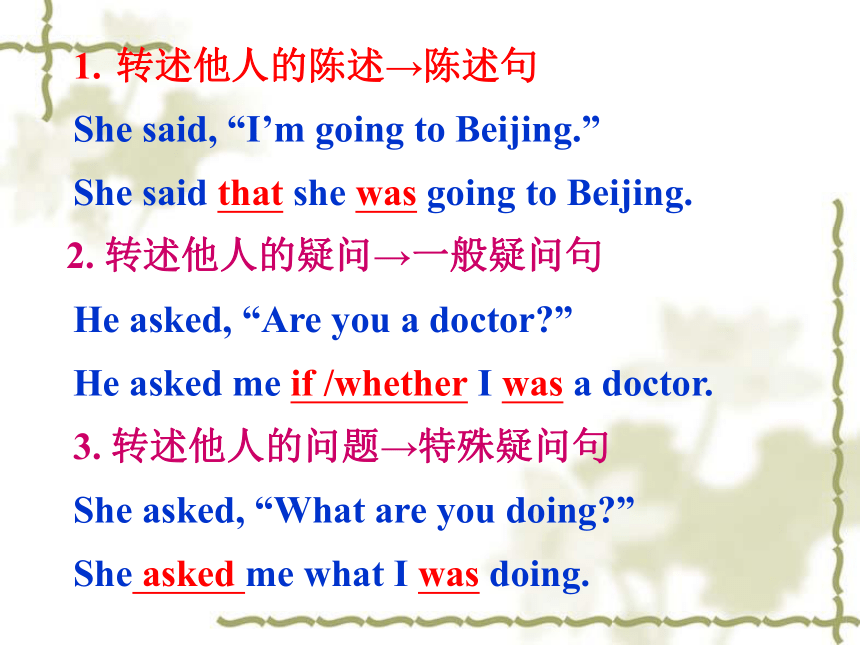
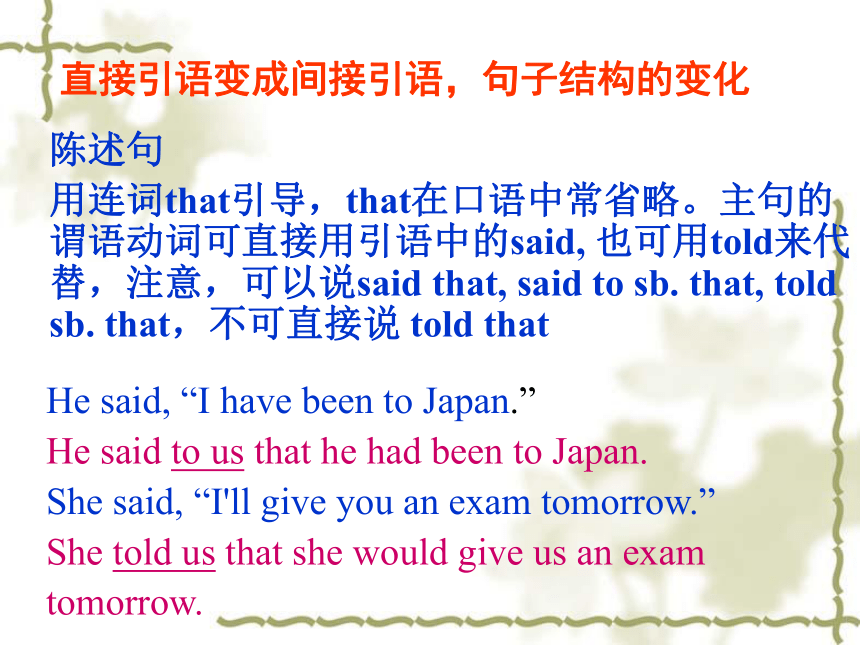
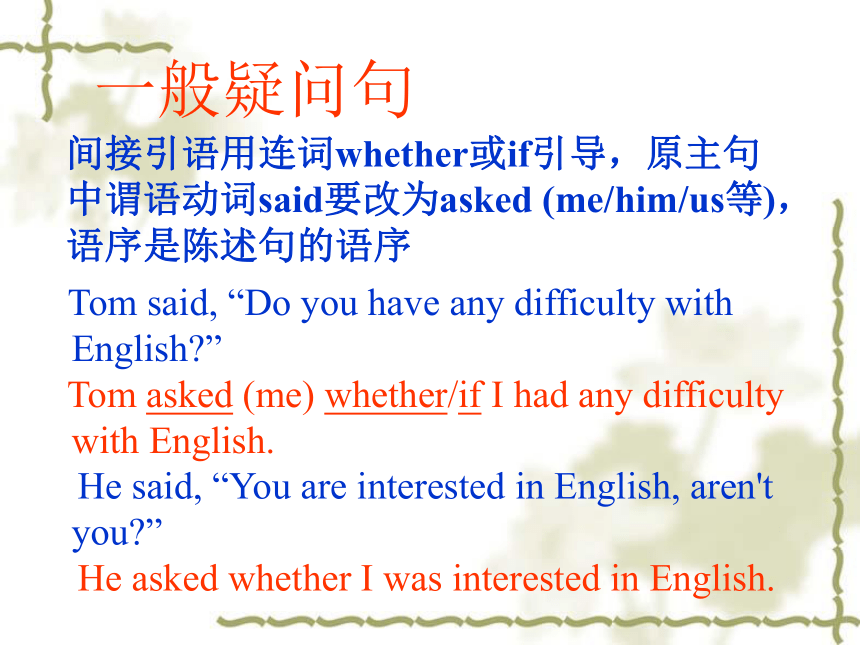
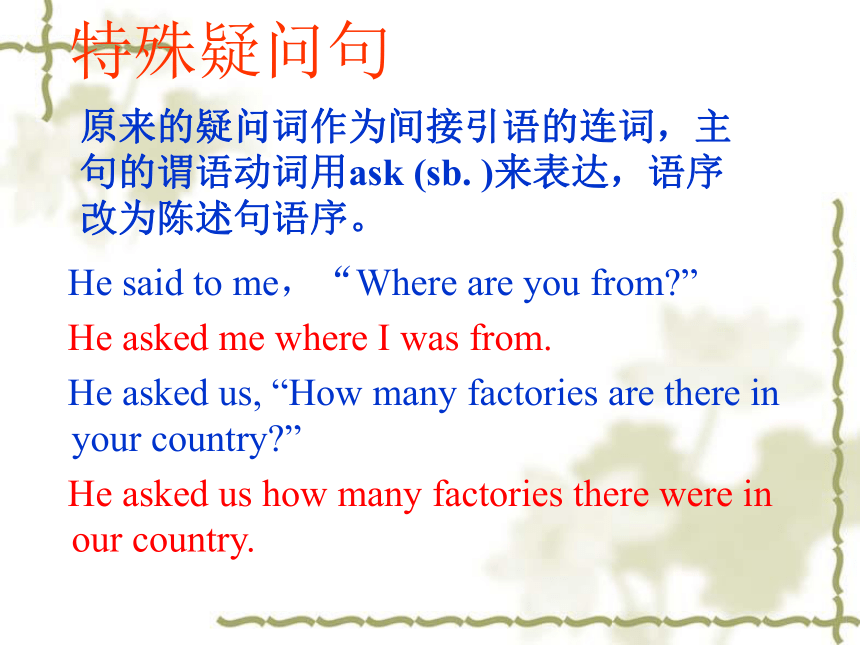
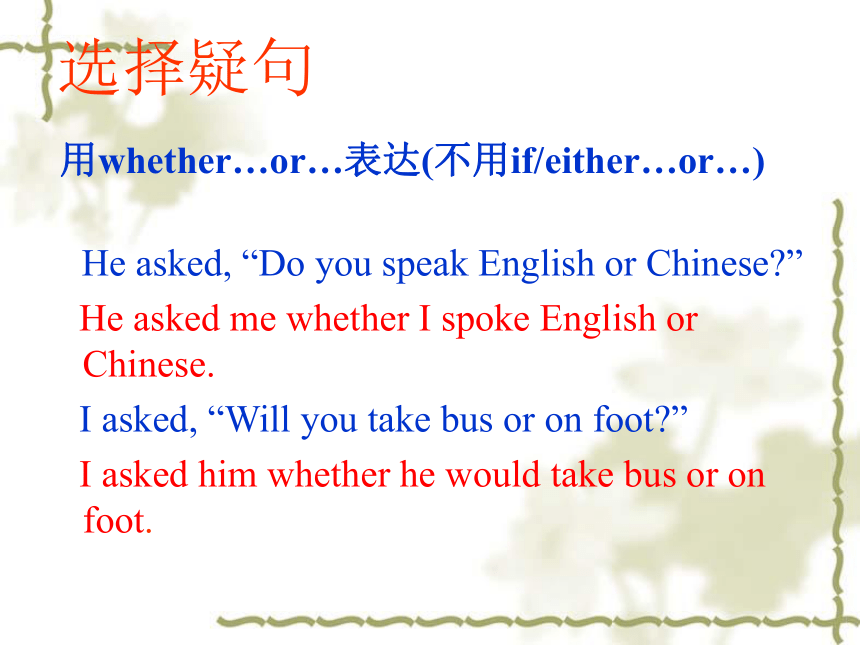
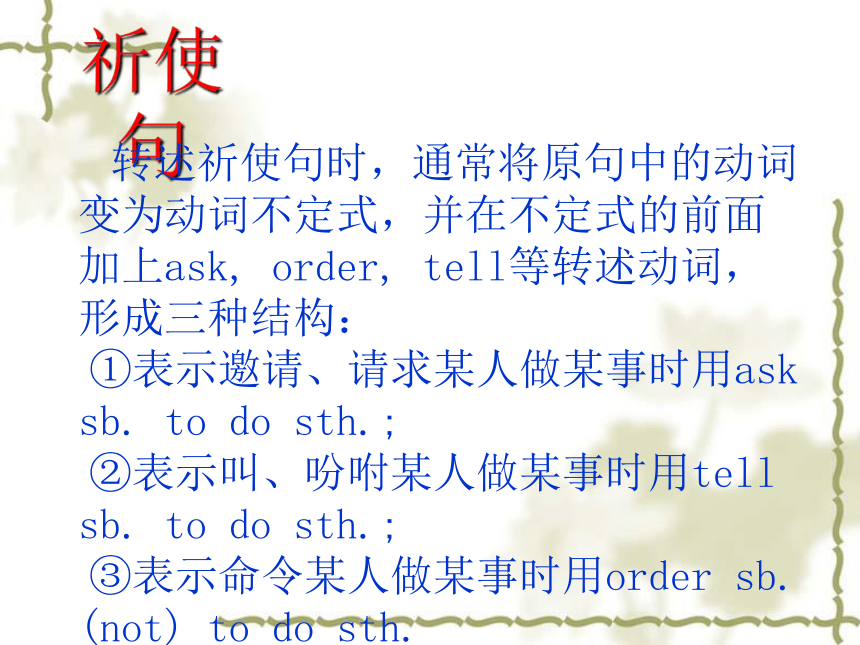

文档简介
课件31张PPT。Unit 1 AdvertisingGrammar and UsageDirect speech and reported speechLead-inT: What did you eat this morning?
Tom: ‘I ate ….’
T: What did Tom say, Jack?
Jack: He said he ate ….direct speechreported speechWe use direct speech to report what exactly has been said. If we write the speech down, the words will usually appear in quotation marks.1. Which one is direct speech and which one is reported speech?
He said, ‘I will go to school tomorrow.’
She told us something secret.
2. Change the direct speech into reported speech.
She said, ‘This film is quite interesting.’
‘Finish the project tomorrow.’ he said to me.
(direct speech)(reported speech)She said that that film was quite interesting.He asked me to finish the project the next day.(Change what has been said to an object clause or
an infinitive phrase.)I am a beautiful girl.She said that she was a beautiful girl.直接引语:直接引用别人的话, 把它放在引号内. (direct speech)
间接引语:用自己的话转述别人的话 (reported speech)What did the girl say?转述他人的陈述→陈述句She asked me what I was doing.She said, “I’m going to Beijing.”She said that she was going to Beijing.He asked, “Are you a doctor?”He asked me if /whether I was a doctor.She asked, “What are you doing?”2. 转述他人的疑问→一般疑问句3. 转述他人的问题→特殊疑问句 He said, “I have been to Japan.”
He said to us that he had been to Japan.
She said, “I'll give you an exam tomorrow.”
She told us that she would give us an exam
tomorrow. 陈述句
用连词that引导,that在口语中常省略。主句的谓语动词可直接用引语中的said, 也可用told来代替,注意,可以说said that, said to sb. that, told sb. that,不可直接说 told that直接引语变成间接引语,句子结构的变化一般疑问句 Tom said, “Do you have any difficulty with English?”
Tom asked (me) whether/if I had any difficulty with English.
He said, “You are interested in English, aren't you?”
He asked whether I was interested in English. 间接引语用连词whether或if引导,原主句中谓语动词said要改为asked (me/him/us等),语序是陈述句的语序特殊疑问句 He said to me,“Where are you from?”
He asked me where I was from.
He asked us, “How many factories are there in your country?”
He asked us how many factories there were in our country. 原来的疑问词作为间接引语的连词,主句的谓语动词用ask (sb. )来表达,语序改为陈述句语序。选择疑句 He asked, “Do you speak English or Chinese?”
He asked me whether I spoke English or Chinese.
I asked, “Will you take bus or on foot?”
I asked him whether he would take bus or on foot. 用whether…or…表达(不用if/either…or…)祈使句 转述祈使句时,通常将原句中的动词变为动词不定式,并在不定式的前面加上ask, order, tell等转述动词,形成三种结构:
①表示邀请、请求某人做某事时用ask sb. to do sth.;
②表示叫、吩咐某人做某事时用tell sb. to do sth.;
③表示命令某人做某事时用order sb. (not) to do sth.例如:
①She said to us, “Please have a rest.”
→She asked us to have a rest.
②The old man said, “Don't smoke in the hall.”
→The old man told me not to smoke in the hall.
③The officer said, “Go away.”
→The officer ordered us to go away. 注意:当祈使句的直接引语变为间接引语时,因为祈使句表示“请求”、“命令”等口气,所以祈使句直接引语变为间接引语时不存在时态的变化。但是人称、指示代词、时间、地点状语等的变化还应根据陈述句直接引语变间接引语的方法进行相应的改变。例如:
One of the doctors said, “Let me go on with the operation, Dr. Bethune.”
→ One of the doctors asked Dr. Bethune to let him go on with the operation. The geography teacher told us that the sun rises in the east and sets in the west.谓语动词时态变化需要注意几点:1.直接引语表述的是客观真理,变为间接引语时,时态不变。The geography teacher said, “The sun rises in the east and sets in the west.”She says that she’ll never forget the days in the country.2. 如果直接引语所表述的内容在目前和说话时同样有效,变间接引语时,时态可不变。The children said, “We love this game.”They told us that they love that game.3. 主句谓语动词的时态是现在时态,在引述时,时态不变。She says, “I’ll never forget the days in the country.”在直接引语变为间接引语时需要注意的变化1. 注意时态的变化2. 注意人称和指示代词变化。3. 注意时间和地点的变化4. 注意个别趋向动词的变化详细介绍详细介绍详细介绍Direct and Indirect Speech课堂练习“Are you going to your home town this summer?” he said. He asked me if I was going to my home town that summer.2. “Why didn’t you call me an hour ago?” he said.He asked why I hadn’t called him an
hour before.3. Mother asked, “What has happened
to you, Xiao Li ?” Mother asked Xiao Li what had happened to him4. He often says “I shall tell you about them.” He often tells me that he will tell me about them.5. Mr Black said, “I have walked a long way this week.”Mr Black said that he had walked a long way that week.6. They said to us, “ Are you afraid to leave this house ?” They asked us if we were afraid to leave that house.A)变下列直接引语为间接引语。
1.“Stop talking!” the monitor said to the class.
2. “Repeat it three times,” the teacher said to her.
???
3. “Will you buy some bread for me?” he said to her.
4.“Don't take off your coat,” she said to her sister.
???
关于祈使句的练习The monitor told the class to stop talking. The teacher asked her to repeat it three times. He asked her to buy some bread for him. She asked her sister not to take off her coat. B) 填空完成间接引语,每空一词。
6. “Don't forget to give the message to my wife,” he said to Li Ping.
??? He _______?Li Ping _______? _______? forget to give the message to _______?wife.
7. “Mum, please help me find my shirt,” he said.
??? He _______? his mother _______? help?_______?find _______? shirt. toldnot tohisaskedtohimhis8. “Use your knife to cut the boots open,” the officer said to the guard.
??? The officer _______? the guard? _______? _______? _______?knife to cut the boots open.
9. “Don't spend too much time on football!” Mother said to me.
??? Mother _______? me? _______? _______? _______?too much time on football.
10. “Will you sleep and get up early, children?” Father said.
??? Father _______? the children _______? _______? and _______? up early.
orderedto use histoldnot to spendaskedto sleepgetC)单项选择。
11. “Don't worry about me,” she _______? her sister.
??? A. said to B. referred to C. thanked to D. spoke
12. “ _______? help me with my English?” she said.
??? A. Shall we B. Do you C. Could you
D. Might you
13. She told me _______? a noise in the hall.
??? A. don't make B. not to make
C. make not to D. to make not ACB14. Martin _______? his dog to lie down under the big tree.
??? A. made B. had
C. promised D. ordered
15. His father asked the boy, “ _______? are doing this for?”
??? A. What; you B. Which; you?
C. Where; we D. Why; we DAFor more exercises, click here. Homework
Review what you have learnt today.Do exercise on page 9was
would be
had read
that
would
had bought
that
would
those
her
Tom: ‘I ate ….’
T: What did Tom say, Jack?
Jack: He said he ate ….direct speechreported speechWe use direct speech to report what exactly has been said. If we write the speech down, the words will usually appear in quotation marks.1. Which one is direct speech and which one is reported speech?
He said, ‘I will go to school tomorrow.’
She told us something secret.
2. Change the direct speech into reported speech.
She said, ‘This film is quite interesting.’
‘Finish the project tomorrow.’ he said to me.
(direct speech)(reported speech)She said that that film was quite interesting.He asked me to finish the project the next day.(Change what has been said to an object clause or
an infinitive phrase.)I am a beautiful girl.She said that she was a beautiful girl.直接引语:直接引用别人的话, 把它放在引号内. (direct speech)
间接引语:用自己的话转述别人的话 (reported speech)What did the girl say?转述他人的陈述→陈述句She asked me what I was doing.She said, “I’m going to Beijing.”She said that she was going to Beijing.He asked, “Are you a doctor?”He asked me if /whether I was a doctor.She asked, “What are you doing?”2. 转述他人的疑问→一般疑问句3. 转述他人的问题→特殊疑问句 He said, “I have been to Japan.”
He said to us that he had been to Japan.
She said, “I'll give you an exam tomorrow.”
She told us that she would give us an exam
tomorrow. 陈述句
用连词that引导,that在口语中常省略。主句的谓语动词可直接用引语中的said, 也可用told来代替,注意,可以说said that, said to sb. that, told sb. that,不可直接说 told that直接引语变成间接引语,句子结构的变化一般疑问句 Tom said, “Do you have any difficulty with English?”
Tom asked (me) whether/if I had any difficulty with English.
He said, “You are interested in English, aren't you?”
He asked whether I was interested in English. 间接引语用连词whether或if引导,原主句中谓语动词said要改为asked (me/him/us等),语序是陈述句的语序特殊疑问句 He said to me,“Where are you from?”
He asked me where I was from.
He asked us, “How many factories are there in your country?”
He asked us how many factories there were in our country. 原来的疑问词作为间接引语的连词,主句的谓语动词用ask (sb. )来表达,语序改为陈述句语序。选择疑句 He asked, “Do you speak English or Chinese?”
He asked me whether I spoke English or Chinese.
I asked, “Will you take bus or on foot?”
I asked him whether he would take bus or on foot. 用whether…or…表达(不用if/either…or…)祈使句 转述祈使句时,通常将原句中的动词变为动词不定式,并在不定式的前面加上ask, order, tell等转述动词,形成三种结构:
①表示邀请、请求某人做某事时用ask sb. to do sth.;
②表示叫、吩咐某人做某事时用tell sb. to do sth.;
③表示命令某人做某事时用order sb. (not) to do sth.例如:
①She said to us, “Please have a rest.”
→She asked us to have a rest.
②The old man said, “Don't smoke in the hall.”
→The old man told me not to smoke in the hall.
③The officer said, “Go away.”
→The officer ordered us to go away. 注意:当祈使句的直接引语变为间接引语时,因为祈使句表示“请求”、“命令”等口气,所以祈使句直接引语变为间接引语时不存在时态的变化。但是人称、指示代词、时间、地点状语等的变化还应根据陈述句直接引语变间接引语的方法进行相应的改变。例如:
One of the doctors said, “Let me go on with the operation, Dr. Bethune.”
→ One of the doctors asked Dr. Bethune to let him go on with the operation. The geography teacher told us that the sun rises in the east and sets in the west.谓语动词时态变化需要注意几点:1.直接引语表述的是客观真理,变为间接引语时,时态不变。The geography teacher said, “The sun rises in the east and sets in the west.”She says that she’ll never forget the days in the country.2. 如果直接引语所表述的内容在目前和说话时同样有效,变间接引语时,时态可不变。The children said, “We love this game.”They told us that they love that game.3. 主句谓语动词的时态是现在时态,在引述时,时态不变。She says, “I’ll never forget the days in the country.”在直接引语变为间接引语时需要注意的变化1. 注意时态的变化2. 注意人称和指示代词变化。3. 注意时间和地点的变化4. 注意个别趋向动词的变化详细介绍详细介绍详细介绍Direct and Indirect Speech课堂练习“Are you going to your home town this summer?” he said. He asked me if I was going to my home town that summer.2. “Why didn’t you call me an hour ago?” he said.He asked why I hadn’t called him an
hour before.3. Mother asked, “What has happened
to you, Xiao Li ?” Mother asked Xiao Li what had happened to him4. He often says “I shall tell you about them.” He often tells me that he will tell me about them.5. Mr Black said, “I have walked a long way this week.”Mr Black said that he had walked a long way that week.6. They said to us, “ Are you afraid to leave this house ?” They asked us if we were afraid to leave that house.A)变下列直接引语为间接引语。
1.“Stop talking!” the monitor said to the class.
2. “Repeat it three times,” the teacher said to her.
???
3. “Will you buy some bread for me?” he said to her.
4.“Don't take off your coat,” she said to her sister.
???
关于祈使句的练习The monitor told the class to stop talking. The teacher asked her to repeat it three times. He asked her to buy some bread for him. She asked her sister not to take off her coat. B) 填空完成间接引语,每空一词。
6. “Don't forget to give the message to my wife,” he said to Li Ping.
??? He _______?Li Ping _______? _______? forget to give the message to _______?wife.
7. “Mum, please help me find my shirt,” he said.
??? He _______? his mother _______? help?_______?find _______? shirt. toldnot tohisaskedtohimhis8. “Use your knife to cut the boots open,” the officer said to the guard.
??? The officer _______? the guard? _______? _______? _______?knife to cut the boots open.
9. “Don't spend too much time on football!” Mother said to me.
??? Mother _______? me? _______? _______? _______?too much time on football.
10. “Will you sleep and get up early, children?” Father said.
??? Father _______? the children _______? _______? and _______? up early.
orderedto use histoldnot to spendaskedto sleepgetC)单项选择。
11. “Don't worry about me,” she _______? her sister.
??? A. said to B. referred to C. thanked to D. spoke
12. “ _______? help me with my English?” she said.
??? A. Shall we B. Do you C. Could you
D. Might you
13. She told me _______? a noise in the hall.
??? A. don't make B. not to make
C. make not to D. to make not ACB14. Martin _______? his dog to lie down under the big tree.
??? A. made B. had
C. promised D. ordered
15. His father asked the boy, “ _______? are doing this for?”
??? A. What; you B. Which; you?
C. Where; we D. Why; we DAFor more exercises, click here. Homework
Review what you have learnt today.Do exercise on page 9was
would be
had read
that
would
had bought
that
would
those
her
